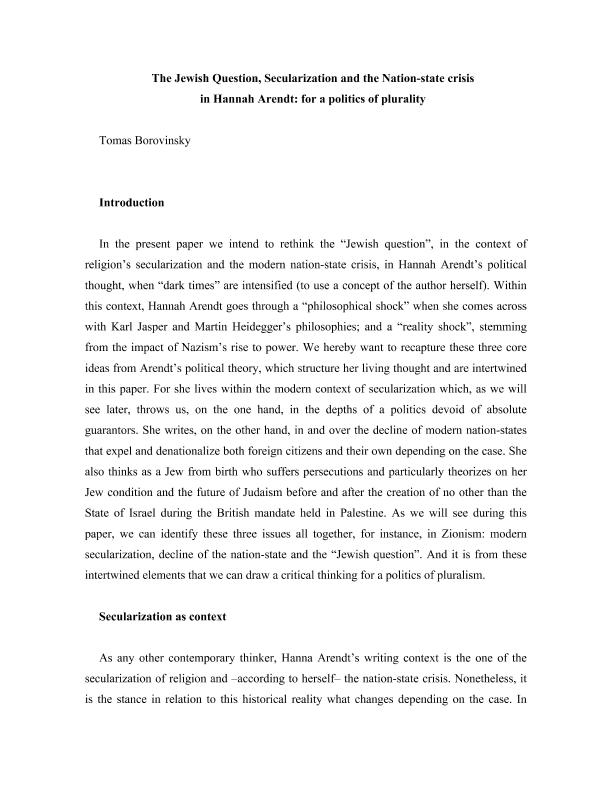Mostrar el registro sencillo del ítem
dc.contributor.author
Borovinsky, Tomás Guido

dc.date.available
2020-05-28T14:44:53Z
dc.date.issued
2016-06
dc.identifier.citation
Borovinsky, Tomás Guido; The jewish question, secularization and the nation-state crisis in hannah arendt: For a politics of plurality; Center for Study of Religion and Religious Tolerance; Politics and Religion Journal; 10; 2; 6-2016; 190-205
dc.identifier.issn
1820-6581
dc.identifier.uri
http://hdl.handle.net/11336/106115
dc.description.abstract
En el presente documento, tenemos la intención de repensar la "cuestión judía", en el contexto de la secularización de la religión y la crisis moderna del Estado-nación, en el pensamiento político de Hannah Arendt. Ella escribe, por otro lado, sobre y sobre el declive de los estados nacionales modernos que expulsan y desnacionalizan tanto a los ciudadanos extranjeros como a los suyos dependiendo del caso. También piensa que es una judía de nacimiento que sufre persecuciones y teoriza particularmente sobre su condición judía y el futuro del judaísmo antes y después de la creación del Estado de Israel. Como veremos durante este artículo, podemos identificar estos tres problemas en conjunto, particularmente en la experiencia sionista: la secularización moderna, el declive del estado-nación y la "cuestión judía". Y es a partir de estos elementos entrelazados que podemos extraer un pensamiento crítico para una política de pluralismo.
dc.description.abstract
In the present paper we intend to rethink the “Jewish question”, in the context of religion’s secularization and the modern nation-state crisis, in Hannah Arendt’s political thought. She writes, on the other hand, in and over the decline of modern nation-states that expel and denationalize both foreign citizens and their own depending on the case. She also thinks as a Jew from birth who suffers persecutions and particularly theorizes on her Jew condition and the future of Judaism before and after the creation of the State of Israel. As we will see during this paper we can identify these three issues all together, particularly in the Zionist experience: modern secularization, decline of the nation-state and the “Jewish question”. And it is from these intertwined elements that we can draw a critical thinking for a politics of pluralism.
dc.format
application/pdf
dc.language.iso
eng
dc.publisher
Center for Study of Religion and Religious Tolerance
dc.rights
info:eu-repo/semantics/openAccess
dc.rights.uri
https://creativecommons.org/licenses/by-nc-sa/2.5/ar/
dc.subject
ARENDT
dc.subject
SECULARIZATION
dc.subject
JUDAISM
dc.subject
NATION-STATE
dc.subject.classification
Otras Ciencia Política

dc.subject.classification
Ciencia Política

dc.subject.classification
CIENCIAS SOCIALES

dc.title
The jewish question, secularization and the nation-state crisis in hannah arendt: For a politics of plurality
dc.type
info:eu-repo/semantics/article
dc.type
info:ar-repo/semantics/artículo
dc.type
info:eu-repo/semantics/publishedVersion
dc.date.updated
2020-05-26T21:14:57Z
dc.identifier.eissn
1820-659X
dc.journal.volume
10
dc.journal.number
2
dc.journal.pagination
190-205
dc.journal.pais
Serbia

dc.journal.ciudad
Belgrado
dc.description.fil
Fil: Borovinsky, Tomás Guido. Consejo Nacional de Investigaciones Científicas y Técnicas; Argentina. Universidad de Buenos Aires; Argentina
dc.journal.title
Politics and Religion Journal
dc.relation.alternativeid
info:eu-repo/semantics/altIdentifier/url/http://www.politicsandreligionjournal.com/index.php/prj/article/view/8
Archivos asociados
